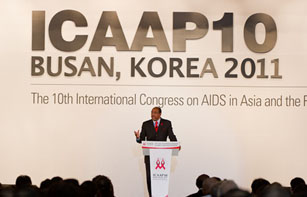
Michel Sidibé, UNAIDS Executive Director, addresses the participants during the opening ceremony of ICAAP 10
Credit: UNAIDS/Kim
The 10th International Congress on AIDS in Asia and the Pacific (ICAAP) opened on 26 August 2011 in Busan, the Republic of Korea, under the theme "Different Voices, United Action." The event, which is held every two years, is hosted by the Joint United Nations Programme on HIV and AIDS (UNAIDS) and the AIDS Society of Asia and the Pacific (ASAP).
Among the delegates attending the opening ceremony were the South Korean Minister of Health and Welfare, Soo-hee CHIN, the President of Fiji, Ratu Epeli Nailatikau, and the UNAIDS Executive Director, Michel Sidibé. They were joined by hundreds of activists and researchers from across the region.
ICAAP comes at an important time in the region’s HIV epidemic and response. According to a new report released by UNAIDS ahead of the Congress, the Asia and Pacific region is at a crossroads: while impressive gains have been made—including a three-fold increase in access to antiretroviral therapy since 2006—progress is threatened by an inadequate focus on key populations at higher risk of HIV infection and insufficient funding from both domestic and international sources.
More than 60% of people living with HIV in Asia and the Pacific are still unable to access HIV treatment. The science shows clearly that when you put people on antiretroviral treatment, it has a 96% protective effect against HIV. So why are we waiting?
Michel Sidibé, UNAIDS Executive Director
“There is no time for complacency in this region,” the UNAIDS Executive Director, addressing an audience of more than 2000 people in the ICAAP opening ceremony. “More than 60% of people living with HIV in Asia and the Pacific are still unable to access HIV treatment. The science shows clearly that when you put people on antiretroviral treatment, it has a 96% protective effect against HIV. So why are we waiting?”
Among the main goals of ICAAP are to empower and strengthen political, community and business leadership by adopting consultative, collaborative and participatory approaches, and to offer a platform where different voices from diverse communities across Asia and the Pacific can reassemble to deliver united action.
“We stand here together because, at the end of the day, we are all seeking the same thing— health, livelihood and acceptance for all, regardless of race, religion, sexual orientation, gender identity, occupation, or HIV status,” said Laurindo Garcia, a Filipino national and coordinator of two regional networks in Asia and the Pacific for men who have sex with men and transgender people.
We stand here together because, at the end of the day, we are all seeking the same thing— health, livelihood and acceptance for all, regardless of race, religion, sexual orientation, gender identity, occupation, or HIV status
Laurindo Garcia, activist
Delegates are expected to engage on a wide range of issues and contexts for the HIV epidemic in the Asia-Pacific region including legal impediments to universal access; recent progress in basic and clinical HIV research; prevention in the rapidly changing communities of men who have sex with men; and the changing political and financial environment, as well as its implication for the AIDS response.
The Congress also seeks to ensure that affected communities and their families are free from stigma, marginalization and discrimination by addressing barriers and working towards societies where the full range of human rights can be taken for granted.
“We have been focusing in South Korea on HIV infection control as the pillar of our national AIDS policy,” said South Korea’s Minister Chin in a statement. “But we realize now that we must change our approach to also address human rights issues in the care of people living with HIV,” she added. Though South Korea has a very low national HIV prevalence, stigma and discrimination remain a major barrier to accessing HIV services in the country’s AIDS response.
Held over five days, the conference has drawn together more than 4,000 delegates representing more than 55 countries for discussion around the AIDS response in the region. The 10th International Congress on AIDS in Asia and the Pacific concludes on 30 August.




